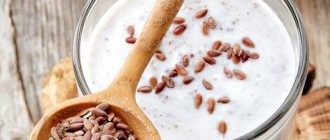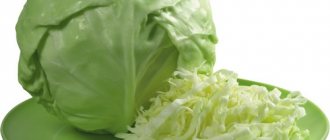Inflammation of the pancreas is a disease that requires a person to pay special attention to their body. Treatment can be complex and involves the use of a large number of medications. However, there are other ways to both relieve symptoms and completely get rid of this unpleasant disease. Traditional medicine has long practiced treating the pancreas with flax seeds.
Flaxseed is a completely unique product containing a huge amount of useful substances: fiber, vitamin E, A, B, iodine, zinc, magnesium, silicon, iron, manganese, calcium, chromium and others. Particular attention should be paid to the fatty acids contained in flax seeds, these are Omega-3 and Omega-6.
Flax seeds for pancreatitis
Medical professionals advise introducing flaxseeds gradually into the diet; this will be a kind of therapy. There are certain and specific contraindications to taking this product; for example, it should not be used if there is intense inflammation in the pancreas and gall bladder.
When preparing a decoction of flaxseeds and its further use, the organ will be enveloped and cell division will significantly slow down during its inflammatory process. This allows you to stop the formation of other foci of the inflammatory process. Favorable dynamics when taking this drug can be seen quite soon. The slippery mass that appears when preparing a solution from flax seeds is characterized by resistance to acids, and the effect can be maintained for a long period.
As soon as signs of pancreatic disease appear in women or men, a specialist can prescribe medication and a special diet as a complex therapy. If dietary nutrition is supplemented with various decoctions of flaxseeds, then such therapy will provide good results.
In addition, flax seeds can eliminate the inflammatory process and help strengthen a person’s immune system, which provides the patient with an even greater chance of successful treatment. Flax can reduce the level of low-density cholesterol in the patient’s blood, and its amino acids help bring blood pressure to normal levels, which reduces the risk of blood clots.
Which doctors should I contact when consuming seeds?
Recommendations for the correct use of the drug will be given to the patient by an endocrinologist, gastroenterologist and nutritionist. Each doctor is responsible for specific problems of the body. For example, a gastroenterologist is responsible for intestinal diseases, a nutritionist will give the necessary advice on diet.
Treatment of pancreatitis with flax seeds will have positive results if you strictly follow your doctor’s recommendations. If you brew flax correctly and take the decoction, a rapid improvement in your condition will become noticeable. The action will last a long time.
The decoction relieves the body of dehydration and prevents the appearance of tumors in the pancreas. There are many recipes with flax seeds; each option copes equally well with the treatment of pancreatitis. Traditional recipes are the best option to say goodbye to any disease.
How to use
Many people may be concerned about how to take flaxseeds for pancreatic disease. Is it better to make tinctures, decoctions, or take them whole? When answering these questions, it must be said that everything depends on how long the reception will take. The product must be introduced gradually. First you need to make infusions, and then make decoctions, jelly and other drinks.
Decoctions promote good envelopment of the mucous membranes of all organs of the gastrointestinal tract and cause a slowdown in cell formation in the presence of an inflammatory process. This ensures that the emergence of new affected areas is likely to be slowed down. The results from using the product are observed quickly.
It is also allowed to eat dishes with a plant element:
- Herbal tea;
- Decoctions;
- Whole grains;
- Kissel;
- Infusions;
- Porridge.
The selection of the type of treatment depends on the nature of the disease and the personal characteristics of the patient. Decoctions of flaxseeds are often used for pancreatitis.
Which is better: white or brown?
You can easily find brown seeds. They are sold all around - in pharmaceutical points, shops, supermarkets. White seeds are much more difficult to find. Finding them will take some effort. If there is a health food store in your city, you can buy white flax seeds there.
White flaxseeds contain more components that are similar to antioxidants. White flax has a milder taste, which cannot be said about brown seeds. White flaxseeds can be given even in childhood.
What is flax
The plant is classified as an herbaceous annual. Used for food and medicinal purposes. Herbalists gradually studied the plant and found that the healing effects of flax help cope with many diseases. The composition of the plant is suitable as a treatment and for preventive purposes for most diseases. Flaxseeds are used for the pancreas - when used, inflammation disappears, immunity increases, and the microflora of the gastrointestinal tract is restored.
Why are flax seeds valuable for pancreatitis?
Linen is valued for its enveloping properties. The seeds contain a lot of fiber that is soluble in water. Thanks to cellulose, a protective film is created on the gastric mucosa, protecting the organs from irritation. The seeds contain useful minerals that help cope with the processing of harmful substances. Flax contains:
- potassium;
- calcium;
- magnesium;
- sodium;
- phosphorus;
- iron;
- copper.
It is considered an ideal repository of B vitamins, which have a beneficial effect on the functioning of the digestive system. Flax is filled with natural substances that are beneficial to the body; side effects rarely occur.
Flax seeds are used for pancreatitis as a treatment for the disease and to prevent the recurrence of pancreatitis or other manifestations of the gastrointestinal tract. The metabolic process in the body is normalized when taken.
Which is better - white or brown?
Brown seeds can be found without much effort. These are sold everywhere - in pharmacies, stores, supermarkets. The same cannot be said about white seeds. It will take a little effort to find it. If a health food store is open in the city, you can only find it there.
White seeds contain more antioxidant-like substances. White ones have a more delicate taste, which cannot be said about brown ones. White seeds are allowed to be consumed by children.
Recipes based on flax seed for treatment
Flaxseed has a regenerating, anti-inflammatory, enveloping effect. For pancreatitis, it is an indispensable element of the diet as part of complex therapy. The most common dish is a decoction of flax seeds, the preparation of which requires a minimum of time.
Recipe No. 1
To prepare the first recipe, you need to take 2 tablespoons of seeds and fill them with water in a volume of 500 ml. Place the mixture in a water bath and keep for approximately 30-40 minutes. Then you need to give the broth time to cool and filter it through a sieve or cheesecloth. The decoction should be consumed 30-50 ml 10-15 minutes before meals.
When making flaxseed decoction, you should strictly adhere to the dosage and holding time in order to maximally preserve all the useful components in the decoction.
Recipe No. 2
To prepare the second recipe, you need to pour flaxseed with hot water in a ratio of 1 to 20. Place the mixture on low heat and boil for 20 minutes. After this, the solution must be given time to cool and filtered using several layers of gauze or bandage. The decoction has indications for the treatment of gastric and duodenal ulcers.
When treating pancreatitis, flaxseed flour can be used. Its basic qualities:
- Cleansing the body of toxic elements helps to get rid of extra pounds.
- It has a beneficial effect on intestinal motility and prevents constipation.
- Reduces the risk of malignant tumors.
- Maintains normal levels of cholesterol in the blood.
- Activates the growth of beneficial microflora in the intestinal tract.
Constant intake of ground seeds for pancreatitis provides a powerful healing result, which is determined by the increased content of plant antioxidants in flour - lignans and dietary fiber. In addition, flax meal is considered a source of selenium, potassium, magnesium, folic acid, protein and polyunsaturated fatty acids.
Note! Flaxseed flour is a storehouse of useful components and microelements.
Scientists have proven that the benefits of taking flax in the diet are great and therefore flax is beneficially used to make medicinal jelly, cereals, and added to baked goods, soups, casseroles and pancakes.
Flaxseed porridge
You can buy flour in a store, but it is better to give preference to the one that was ground right before making the dish. How to use ground flaxseeds for pancreatitis? You need to grind 4 tablespoons of seeds in a coffee grinder, add a little salt, cinnamon, and raisins. Add a tablespoon of honey to this mixture and, stirring, add hot water until the desired consistency of the dish is obtained. Flax porridge goes well with banana, kiwi, blueberries, and strawberries. These fruits can simply be added to already prepared porridge.
Flax jelly
A very healthy drink that has enveloping and nutritional qualities. It is recommended to take it for the treatment and preventive measures of diseases of the digestive system, including pancreatitis.
Note! Thanks to its enveloping properties, flaxseed jelly protects the mucous membranes of the digestive system from damage, and also helps heal minor inflammatory processes.
To prepare, you need to take 4 tablespoons of flour, dilute them in warm water, stir well. Pour 1 liter of hot water or milk into this solution. Place on the stove, stir the jelly so that the flour does not form lumps, and bring to a boil. Then cool the mixture, add a few spoons of honey, lemon or orange zest. It is recommended to consume it as an independent dish, taking jelly exclusively on an empty stomach.
Therapy for pancreatitis is a long process, for this reason flax must be consumed throughout the entire course of therapy, strictly adhering to the recommendations on how to brew and use flax seeds for the inflammatory process in the pancreas.
Healing properties of flaxseed
Fiber, which is part of flaxseed, plays an important role in regulating the functions of the gastrointestinal tract. It removes toxins from the body by adsorbing them on itself.
Fiber normalizes intestinal motility, which greatly improves the quality of life for people suffering from constipation. There are no side effects such as bloating or flatulence.
Flax seeds produce a large amount of mucilage when swollen in liquid. This property is actively used in the treatment of the digestive system. Mucus gently envelops the walls of the stomach and intestines, thereby preventing contact with aggressive juices of the digestive system. Thus, mucus formed by consuming flax seeds can protect the body from inflammatory processes and accelerate the healing of damaged organ areas. In addition, the barrier created by mucus between food entering the stomach and its walls makes it possible, to one degree or another, to reduce the amount of fat absorbed by the body. This property is important during the diet prescribed by the doctor during treatment, but does not mean at all that while taking flax seeds, you can not deny yourself fatty foods.
Flaxseed has a pronounced choleretic effect, which must be taken into account in case of pancreatitis (depending on the stage and characteristics of the disease, a recommendation may be given to take choleretic drugs, or a complete ban on their use may be imposed).
Flax contains vegetable protein, which is recommended for consumption during a therapeutic diet.
Flaxseed prevents the growth of cancer cells.
Omega-3 fatty acids have a beneficial effect on the functions of the entire body, from normalizing cholesterol in the blood to improving all metabolic processes.
Omega-3 fatty acids contained in flaxseed have a beneficial effect on brain activity
Complex carbohydrates contained in flax seeds do not pose a danger for diseases such as diabetes, since they do not increase the glycemic index. That is why nutritionists insist on introducing this wonderful product into the diet.
Flax seeds improve the functioning of the immune system, which allows not only to get rid of inflammation of the pancreas, but also to improve overall health. Some associate this property with the content of a special component in flaxseed - lignans. These are substances that are essentially phytoestrogens and have an antioxidant effect on the body.
Recipes at home
To be effective in taking seeds, you need to follow a number of principles for their use. Then you will be able to achieve rapid action and treatment. To get this effect, you need to increase the dose of water in your diet, since the seeds contain a large amount of fiber. Daily water intake should be within 2 liters.
You need to reduce your intake of salty foods. This will help protect the pancreas from swelling and help remove toxic substances from the body. Due to the rapid loss of healing qualities, it is recommended to use the decoction fresh.
The daily intake of seeds for patients with pancreatitis should not exceed 10-30 grams.
Herbal products for patients with a diseased pancreas:
- Take 50 ml orally 30 minutes before meals of flaxseed decoction. The course of therapy is 2-3 weeks;
- Mix a tablespoon of flax in a glass of warm water. Boil for 5 minutes and give the drink time to infuse;
- In case of exacerbation of the disease, pour 20 g of flaxseed into 1 liter of water, leave the mixture for 6 hours, strain and consume 100 ml before meals;
- For the treatment of gastritis you need to take 1 tsp. Seeds, 0.5 cups of boiling water. Whisk the solution until a slimy mixture forms. Using gauze, filter the composition and drink 30 minutes before meals.
- Pour 15 g of seeds into 200 ml of kefir. Let it brew for 3-4 hours. No need to cook on the stove. Drink the composition instead of breakfast or dinner.
- Rinse 35 g of flax seeds, pour 600 ml of hot water. Cook on the stove for 10 minutes, let it brew under the lid for an hour. Then strain through a bandage or gauze, pour into a thermos so that the composition does not cool down. Drink warm 5 times a day, 200 ml.
- Mix 70 g of flax seeds in 1 liter of water. Cook for 2 hours over low heat. Then strain, cool, and store the mixture in a cool place. Before meals, drink a glass for 2 months.
- Grind the seeds into flour using a coffee grinder. It should be diluted in a ratio of 2 teaspoons per glass of water. Cook for 10 minutes, stirring constantly. After cooking, cool and strain. Drink 2 tablespoons 30 minutes before meals.
Seeds are also used in combination with other plants:
- Take equal parts of burdock, dandelion, plantain and 4 parts of flaxseeds to prepare a decoction in the proportion of 1 liter of water per 2 tablespoons of herbal mixture. Plants are poured with boiling water and infused. Take a tablespoon 4 times a day.
- Fill the same amount of St. John's wort and blueberries (a tablespoon each) in combination with 3 tablespoons of seeds with a liter of boiling water. Drink a tablespoon before meals.
During therapy and preventive measures, it is recommended to consume the seeds in different forms (pure form, jelly, decoction, porridge, etc.) for at least a year.
The decoction should be consumed warm, 30 minutes before meals. The first improvements will be noticed after a month of therapy with this method. Whole or ground seeds are used - the effect does not change.
Benefit or harm
Flaxseeds are certainly beneficial for the body, especially for gastrointestinal diseases. They have a large number of different beneficial qualities. This is determined by their chemical structure, which, in addition to fiber, includes many useful vitamins and microelements. The main therapeutic functions include:
- Enveloping effect. Flax seeds are rich in water-soluble fiber. Penetrating into the gastric tract, it evenly begins to envelop the gastric and intestinal walls, protecting them from the negative effects of excessively fatty, fried, smoked foods. This does not mean that with the help of seeds it is possible to completely protect yourself and not adhere to a dietary diet, but it guarantees some kind of protection.
- Normalization of intestinal motility. By this, flaxseeds prevent the occurrence of various diseases of the digestive system. The risk of constipation and other intestinal disorders is reduced.
- Slowing down cell division. By doing this, you can save yourself from the appearance of tumors during the inflammatory process of the pancreas, which helps you recover faster and protects you from complications.
- Stimulation of immune activity. Flaxseed therapy helps to get rid of not only pancreatitis, but also numerous other infectious diseases due to its own immunostimulating effects.
- Normalization of the general condition of the body. Flaxseeds, due to their own chemical structure, normalize the general condition of the human body and are considered to prevent heart and vascular diseases, including heart attack and stroke. Therapy with flaxseed can reduce cholesterol levels, helping to reduce the risk of thrombosis. Your appearance will improve as your skin and hair will look significantly better. For this reason, flax is also used in cosmetology.
In addition, lingates found in the structure of flax exhibit a normalizing effect on the production of enzymes. With chronic inflammation of the pancreas, enzymes produced by the body begin to destroy the gland.
Description of the disease
Pancreatitis is inflammation of the pancreas tissue. The inability of bile to enter the duodenum, as well as the harmful effects of poor diet, alcohol and concomitant diseases, leads to partial inflammation of the gland tissue.
The disease causes a number of characteristic symptoms. These include non-stop vomiting, nausea and acute pain during attacks of pancreatitis. They are accompanied by high body temperature and a feeling of bitterness in the mouth.
The chronic phase is characterized by systematic pain in the abdominal cavity after eating, aversion to drinking and food, and pale skin. Patients are concerned about indigestion, constipation, alternating with diarrhea.
Treatment is based on pain relief, anti-inflammatory therapy, restoration of metabolism, bile output and intestinal function. Traditional methods can also be used if recommended by a doctor, including flaxseeds.
Contraindications
In addition to the beneficial effects of flaxseeds, there are also known contraindications; side effects (feeling of nausea, pain in the intestinal tract) can also be observed less frequently. Treatment of pancreatitis with flaxseeds is contraindicated if:
- Colitis, crisis.
- Exacerbation of cholecystitis.
- The period of bearing and feeding a child.
- Acute form of pancreatitis.
- Individual intolerance to flax seeds.
- Kidney stones.
Experts advise introducing seeds gradually. If the inflammation worsens, you need to stop eating flax.
Flax seed for acute pancreatitis
Experts advise carefully introducing flaxseeds into your diet. There are certain contraindications, and this applies to the acute stage of pancreatitis, as well as the presence of gallstones.
A decoction prepared from flax seeds not only envelops, but can also slow down cell division during pancreatitis, and this can slow down the occurrence of tumors in the gland. This provides a favorable result for the resumption of its basic function. The mucus that appears during the preparation of the decoction is resistant to acid. For this reason, its enveloping effect lasts for a long period.
For pancreatitis, a specialist prescribes medications and advises a diet. Taking freshly prepared flaxseed recipes in acute pancreatitis is contraindicated and should not be used by patients.
Flax seed flour
Flax seed powder, prepared at home, differs from flaxseed flour, but is no less valuable in its properties.
The flour is prepared as follows: keep the flax seeds in boiling water for 20 minutes, then dry, grind, dry again and repeat the grinding. Its valuable and medicinal properties are undeniable:
- affects the process of digestion and intestinal motility;
- preventive measure for cardiovascular diseases;
- hormonal levels improve;
- special substances - lignans stop the growth of malignant tumor cells. As a preventive measure, eat up to 100 g per day;
- promotes weight loss, as there are few carbohydrates. 35 g of flaxseed flour are dissolved in a glass of boiled warm water. Drink 0.1 liter half an hour before meals;
- suitable for a diet for diabetes;
- as a laxative or cleanser, use 35 g per 200 ml of kefir or bio-yogurt;
- Flour can be used in baking as an additive, but bake at a temperature no higher than 150?, in porridges - steam.
Flax seeds for chronic pancreatitis
For chronic pancreatitis, doctors allow the use of recipes using flaxseed. You can take a course of porridge, jelly, flax decoctions, and various mixtures. Their use should only be carried out with the permission of the attending physician after research has been carried out. In other cases, flax can be harmful for pancreatitis.
Be sure to take a course of flax treatment. You should not use it as a regular dish in your diet. The course usually lasts 2-4 weeks.
What is the value
Flax seed has a rich composition, but polyunsaturated acids are of particular value. They imbue flax infusions and decoctions with beneficial properties such as lowering blood cholesterol levels and normalizing blood pressure. The plant contains:
- iron, which prevents the development of anemia, which is difficult to treat if there is inflammation in the digestive system;
- phosphorus, necessary for the absorption of calcium;
- calcium, necessary for strong bones and influencing the development and formation of physical parameters of the human body;
- magnesium, which eliminates fatigue and nervous tension that are characteristic of the disease;
- B vitamins, which reduce the effects of exhaustion and preserve the nervous structures of the body;
- potassium, which strengthens muscles and prevents rotting processes in the intestinal area.
These substances are also present in other foods, but in some situations they cannot be consumed because they are poorly absorbed by the body.
Proper preparation of flaxseeds will allow you to absorb their components and improve the condition of the digestive system without causing severe irritation.
These beneficial properties and the presence of a large amount of water-soluble fiber in the plant allow you to digest other foods. For pancreatitis, flax seed improves metabolism and is a prophylactic agent that prevents re-inflammation.
We recommend reading: Is it okay to eat broccoli for pancreatitis?
Flax for intestinal inflammation
For acute inflammation of the intestinal tract, enterocolitis, colitis and infectious diseases, infusions of flaxseed and certain spices, which include essential oils, will be effective as a therapeutic and prophylactic agent.
Flaxseeds have been used for intestinal therapy for many centuries. During this period of time, traditional medicine has created many recipes.
- Flaxseeds with kefir.
The most famous and widespread method. This method will help to heal and cleanse the intestines. Allowed for use in children from 3 years of age. You can prepare it according to this scheme:
- Place a tablespoon of crushed seeds in a faceted glass of kefir. Drink this mixture for 7 days.
- Over the next 7 days, you need to increase the flaxseeds to 2 tablespoons per glass of kefir.
- For the next 2 weeks, drink a glass of kefir with 3 tablespoons of seeds every day on an empty stomach.
Within a month, the intestines will become healthier and cleared of toxins, and this will help eliminate the inflammatory process.
- Whole seed.
This method is suitable not only for eliminating inflammation, but also for general health improvement and weight loss. Pour half a glass of flax seeds with cold water overnight. In the morning, drink 350 ml of warm water, drain the water from the seeds and after 30 minutes eat them without any additives, in their pure form. You can only eat at lunchtime.
- Kefir and flaxseed flour.
Kefir with flaxseed flour will also help eliminate inflammation. To do this, the seeds must be ground in a coffee grinder. The proportion used is: a tablespoon of flour per glass of kefir. Drink in the morning for a month.
Note! Before taking flaxseed for intestinal inflammation, be sure to consult a specialist and consult on the use of such recipes. Flax can be harmful.
Risks
The nutrients contained in flaxseed may not be beneficial for everyone. People should avoid flaxseed products or consult a doctor first if they:
- use blood thinners such as warfarin (Coumadin) or aspirin;
- use non-steroidal anti-inflammatory drugs;
- take cholesterol-lowering medications;
- have hormone-sensitive breast or uterine cancer;
- are pregnant or breastfeeding;
- suffer from an allergy to flaxseed.
In general, people who eat flaxseed should avoid raw and unripe flaxseeds, as they may contain toxic compounds. Consume flaxseed ground and with plenty of liquid to prevent digestive problems.
Buy only small bottles of flaxseed oil in dark bottles and store them in the refrigerator, as the oil can spoil quickly. Also, do not use oil after the expiration date stated on the label.
Avoid heating flaxseed oil when cooking. Add oil to already prepared dishes and do not heat it in the microwave.
Flax for kidney inflammation
Acute kidney inflammation is characterized by chills and fever, pain in the lower back, frequent and painful urination, and cloudy urine. In addition, patients may complain of weakness, headaches, pain in the joints and muscles.
When examining patients, typical abnormalities are found. Often, kidney inflammation can occur in pregnant women. In certain cases, the primary course of pyelonephritis is formed, in others, acute inflammation can become chronic.
In the treatment of kidney inflammation, mucous infusions of flaxseeds, as well as flaxseed oil, are widely used. The use of seeds provides a more effective effect when combined with numerous plants that are used for kidney disorders.










